For most pet parents, potty training a puppy is probably the most important aspect of getting their new pet. But no matter how diligent your training methods are, some puppies can be downright stubborn when it comes to potty training.
So, why are you having trouble potty training your puppy? Are you doing something wrong, or is your puppy just being difficult?
Read this guide for our top training tips on how to potty train a stubborn puppy.
How To Potty Train A Stubborn Puppy
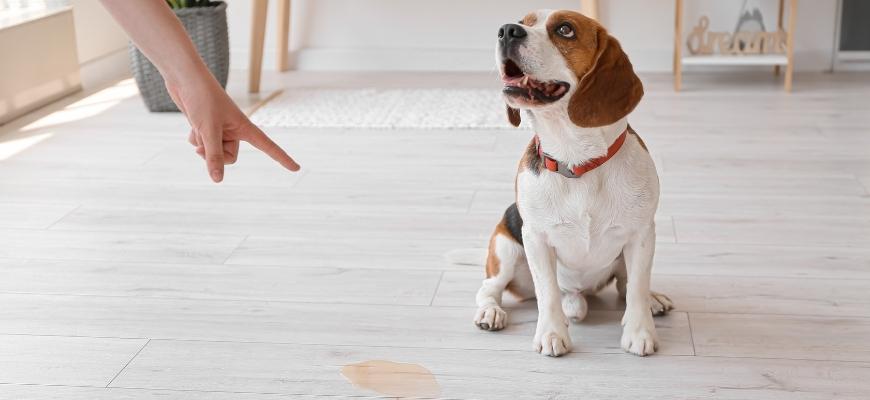
The first thing you must know is toilet accidents are all a part of the successful potty training journey!
Your puppy is learning something alien to him. After all, young puppies generally pee and poop when they need to, wherever they are. So, learning to relieve himself at a particular potty spot during a defined potty break is something new, and accidents are bound to happen occasionally.
If your pup forgets and does his business in the house, he’s not being deliberately spiteful or stupid. Never become rough or angry with your furbaby. Make his new home a safe, welcoming environment where you are his guardian, best friend, and provider. Your puppy should never be afraid or wary of you.
Here are some top training tips for successfully potty training a stubborn puppy.
1. Use A Crate
Dogs are naturally clean creatures that won’t soil their beds or areas in your home where they like to hang out.
So, if you’re using a crate to potty train your puppy, your pet will be reluctant to relieve himself in there. Make sure that the crate isn’t too big so that your puppy uses one end of the crate as a bathroom spot and the other end for sleeping. If necessary, use a crate divider to restrict your pup’s movement in the crate.
2. Introduce Outside Space
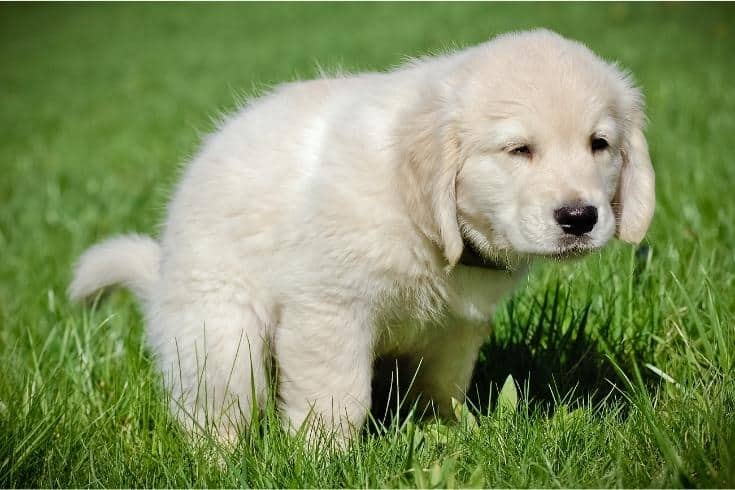
Ideally, you want to introduce your puppy to an outdoor space where he can choose a potty spot where he can go whenever he wants to go. Dogs work on a kind of scent messaging system.
Marking their patch with urine is something that male dogs do habitually, and healthy puppies are no different. So, if your puppy cocks his leg on a particular tree or rock in your garden, that’s his way of telling other passing animals that he’s been there. Ever after, your puppy will use that tree or rock as his chosen potty spot.
3. Prevent Inside Toilet Spots
Most breeders keep puppies and their mothers in a relatively small area for easy cleanup and supervision.
When you bring your puppy home, he will most likely find himself in a massive area where he can play and explore. If your puppy is able to run around your home unsupervised, he will almost certainly pick a quiet spot well away from you and your family and use it as a toilet spot.
That spot could be a corner in your home office or under a table in your guest bedroom. And once your puppy has relieved himself there, his scent will remain, telling the little guy that’s his designated potty spot.
Once you’ve discovered your puppy’s bathroom spot, you need to clean it with an enzyme cleaner that will get rid of your puppy’s scent. Then, you need to restrict the space to prevent future accidents. To do that, you could shut your puppy out of that part of the house and keep him where you can watch him or uses a baby gate to fence off the area.
4. Give Your Puppy Regular Potty Breaks
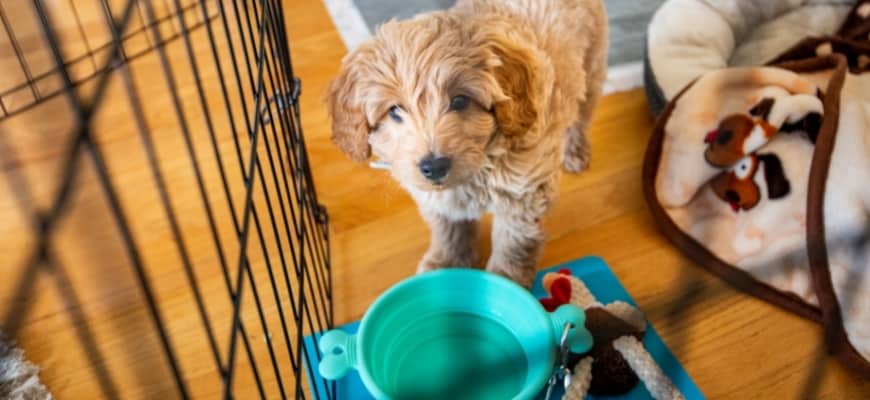
Puppies have small bladders, and they need to frequently urinate until they reach adulthood. Unlike mature dogs, puppies don’t know yet when they need to go to the bathroom. So, you’ll need to provide your puppy with plenty of potty breaks so that your pet doesn’t relieve himself inside the house and gets the idea that he must wait until you take him outside.
Each time your puppy relieves himself at his designated outdoor toilet spot, reward him with a treat. Within a very short period of time, your pup will learn that each time he asks to go outside, he’ll get a yummy treat, so it’s a win-win!
5. Take Your Puppy Outside Often
We highly recommend that you take your puppy outside to his designated outside potty spot at least every hour or two. To help you remember to do that, set a timer to remind you. Once you’ve established a consistent routine, you can make the outside trips less frequent.
So, a two-month-old puppy usually needs to pee immediately after:
At that young age, your puppy cannot go for more than that length of time without a potty break.
Learn Your Puppy’s Potty Cues
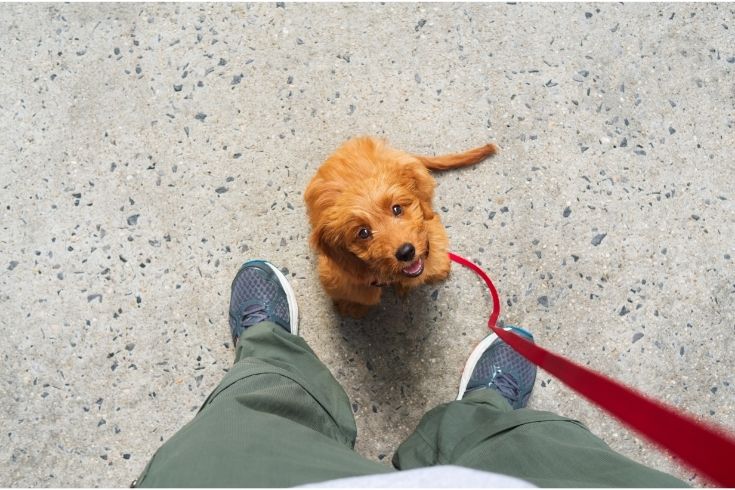
Healthy puppies and dogs provide plenty of cues that tell you when your furry friend needs to go potty. As soon as you see one of those cues, pick up your puppy before he has a chance to pee or poop and take him outside to his potty spot.
Typical potty cues include circling and sniffing the ground. As your pup gets older and his potty training is progressing, he might go to the door and cry or scratch at the door, asking to be let outside.
Use Reward-Based Training Methods
Most puppies are food-oriented, and they love treats! Reward-based training works extremely well with puppies, whether you’re crate training or going through the house training process.
Buy some high-value training treats and keep them in a fanny pack or pouch with you at all times. That way, as soon as your puppy has done his business in the appointed place, you can reward him immediately.
Use praise and petting as a reward for good behavior, too. Don’t hold back! Plenty of fuss and praise will only encourage your puppy to try to please you by showing the behaviors you’re rewarding.
Wait until your puppy has finished before you give him a reward. If you give your puppy treats before he’s finished, he might stop and then finish off inside your home.
Clean Up Accidents Thoroughly
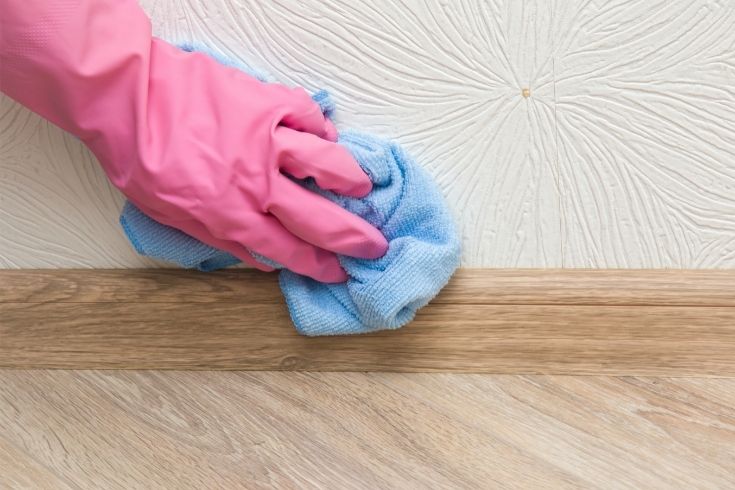
One of the most common potty training problems is when a dog pees or poops inside your home and then returns to the scene of the crime repeatedly.
Dogs use their scent to mark their favorite potty spot. Dog urine is a pungent, persistent scent that’s almost impossible to get rid of. In addition, dogs have a much better sense of smell than we do and can pick up the tiniest lingering scent of their pee from your carpet.
So, you must keep your puppy out of the room where the accident took place until you’ve cleaned the floor thoroughly. Use a cleaning product that’s pet-odor specific, pet-friendly, and ideally contains enzymes that will kill the bacteria responsible for causing the smell.
In severe cases, some of the scents will be left behind on your carpets, even though you can’t smell them yourself. That means your puppy will still be drawn to that spot time and again, even after you’ve potty-trained him completely.
For that reason, we recommend that you hire a professional carpet cleaning company to clean your carpet. Pro cleaning firms use antibacterial and deodorizing products that are not generally available to the public. These products work much more efficiently than anything you can buy in the shops.
Frequently Asked Questions
In this section of our guide, we answer some of the most commonly asked questions on potty training stubborn puppies.
Q: Should I use puppy pads for housetraining my puppy?
Some people like to use puppy pads for housetraining a puppy. However, training pads can present a safety hazard, so we don’t recommend that you use them.
Puppy pads can actually delay the training process. If your puppy thinks he’s okay to relieve himself on the pads, he won’t understand that he should be doing his business outside. Training pads can also present a choking hazard to puppies that rip up the pads and swallow the pieces.
That said, if you live in an apartment, you might want to try using real grass pads that are shipped right to your door. The grass is a natural odor neutralizer and attractant, and grass potty pads can provide a helpful alternative to the outdoor experience for your puppy.
In addition, outdoor-themed training pads teach your puppy that the grass is where he should be doing his business and won’t confuse him as fabric pads can.
Q: What age should puppies be fully toilet trained?
It generally takes from four to six months to fully housetrain a puppy, although some puppies can take up to a year. The pup’s size is also a factor. For example, smaller breed dogs have small bladders and higher metabolisms than larger dogs. Therefore, a Pug will need more potty stops than a German Shepherd.
Adult dogs can take longer to potty train than puppies, generally due to previously learned behaviors.
Q: How do you discipline a stubborn puppy?
If you need to discipline a stubborn puppy, always use constructive punishment methods. Constructive punishment teaches your dog through conditioning so that the puppy quickly understands what’s permissible and what’s not.
Constructive disciplinary methods that are regarded by trainers as being beneficial and positive can include:
- Time-outs
- Using your voice to tell your puppy that what he’s doing is wrong
- Taking your puppy’s toys away from him
- Denying your puppy your attention when he’s misbehaving
These are humane and efficient disciplinary methods that work. Your pup won’t be afraid or wary of you, but he will understand that his behavior is unacceptable.
Q: Does rubbing your dog’s nose in pee work?
Do not rub your puppy’s nose in pee or poop when he has an accident. That teaches your dog to fear you and could lead to him hiding away when he needs to relieve himself, potentially setting back your potty training process. Some dogs can respond to inappropriate punishment aggressively, too.
Q: Why does my puppy poop inside after being outside?
Your puppy might poop inside the house because something outside has frightened them and made them feel anxious.
Some dogs have nervous personalities and loud noises; other dogs’ barking, traffic, thunder, or people shouting can be quite alarming to a shy puppy. Some puppies hate the rain and wind, so they might be reluctant to relieve themselves outside.
Q: What is the hardest dog breed to potty train?
Generally, companion dog breeds are the most difficult to potty train. Most trainers regard the Dachshund as the hardest dog breed to housetrain.
These dogs are intelligent but stubborn. Dachshunds also hate the snow, rain, and wind, so they can be difficult to lure outside to go potty.
Q: Should you scold a dog for pooping inside?
You should never lose your temper or punish a dog for pooping inside your home. Potty accidents go with the territory of owning a puppy!
Dogs don’t understand the discipline that’s delivered “after the fact.” So, if you arrive home to discover a pile of poop on the floor and scold your dog, your pet won’t have a clue what he’s done to earn your disapproval. The best approach is to clean up the mess and move on.
Next time you leave your puppy alone, remember to take him outside for a potty break.
Final Thoughts
I hope you enjoyed our tips and tricks for dealing with a puppy that’s proving stubborn to potty train. If you found the information helpful, please take a moment to share it.
Puppies of certain breeds can be stubborn when it comes to potty training. So, you need to use positive reinforcement and reward-based training methods to show your little buddy that going potty in the appropriate place is the best way to go. Take your puppy outside often, pick a designated potty spot in your backyard, learn to recognize cues that your pup needs to go, and crate-train your pup.
Was your puppy easy or stubborn to potty train? Tell us how you did in the comments box below!

